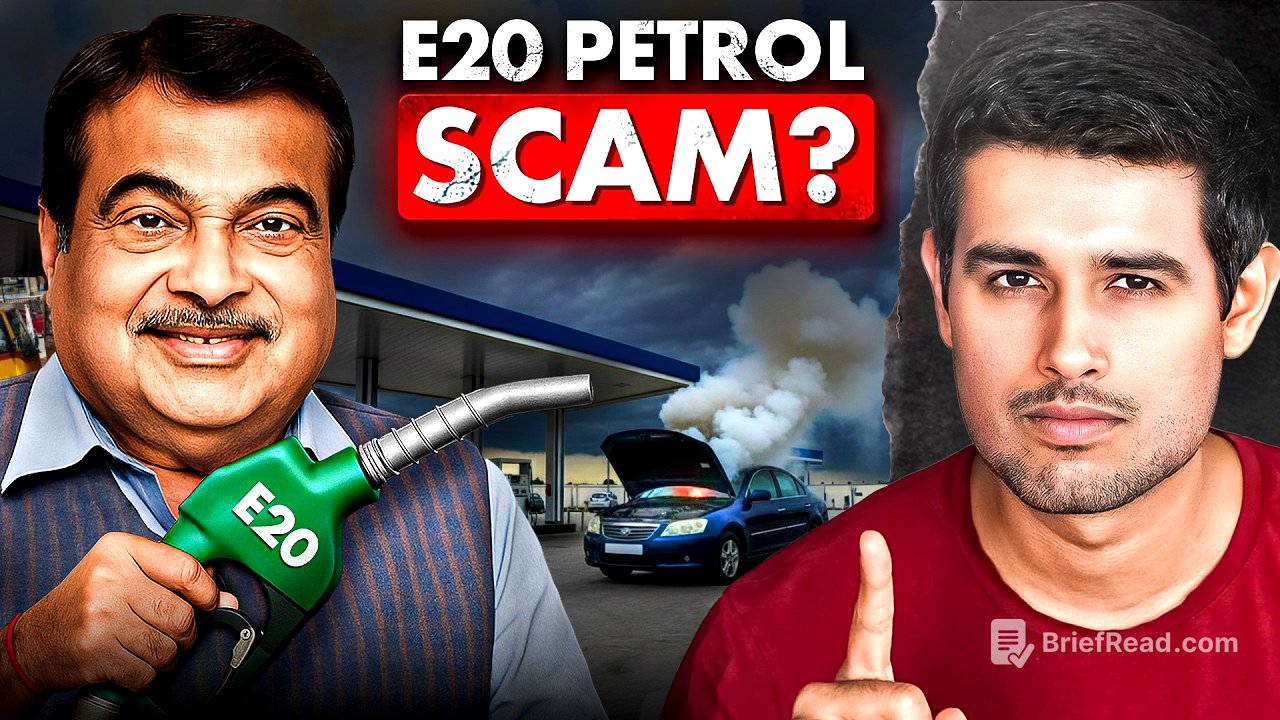TLDR;
This video discusses the Indian government's implementation of E20 fuel (20% ethanol, 80% petrol) nationwide and its implications. It highlights the potential benefits of ethanol blending, such as reduced emissions and decreased reliance on crude oil imports, but also points out the problems with the rushed implementation, including decreased mileage in older vehicles, potential damage to non-compatible engines, and the lack of price reduction for consumers. The video also raises concerns about potential conflicts of interest involving government officials and their families' involvement in ethanol production.
- E20 fuel is now mandatory in India, raising concerns about its impact on vehicles and consumers.
- Ethanol blending has potential environmental and economic benefits but faces implementation challenges.
- Allegations of conflict of interest arise due to a minister's family's involvement in ethanol production.
Introduction to E20 Fuel [0:00]
The Modi government has implemented E20 fuel across India, which consists of 80% petrol and 20% ethanol. This implementation is not optional, requiring all petrol vehicles to use this fuel. A central government minister, whose sons own ethanol-producing sugar plants, is seen as the primary beneficiary, while the common people are perceived as the biggest losers. This situation has led to accusations of a scam on social media.
The Logic Behind Ethanol Blending [0:44]
Ethanol, an alcohol that can be used as a biofuel, is produced from crops like sugarcane, corn, or rice. Sugarcane is the most effective due to its high sugar yield per acre. Ethanol mixes well with petrol, acting as an oxygenate to improve combustion and reduce air pollution. Research indicates that ethanol from sugarcane can reduce greenhouse emissions by 65% compared to petrol. Additionally, ethanol production can reduce dependence on volatile and expensive crude oil imports.
History of Ethanol Blending in India [2:36]
Ethanol-blended petrol has been available in India since January 2003, initially targeting 5% ethanol blending. Progress was slow, reaching only 1.5% by 2014. After the BJP came into power in 2014, the blending limit was increased to 10%. In 2018, a new target of 20% ethanol blending by 2030 was set, which was later preponed to 2025. By March 2025, the government achieved this target and rolled out E20 fuel nationwide.
Consumer Complaints and Issues with E20 Fuel [3:30]
Following the rollout of E20 fuel, many people complained about decreased mileage and potential damage to vehicle parts. A major reason for these issues is the limited number of E20-compliant vehicles on Indian roads. Using E20 fuel in vehicles not designed for it can damage the fuel system due to ethanol attracting water molecules, leading to corrosion, rust, and blockages. This water can also damage rubber components and filters, weakening engine performance.
Compatibility and Modifications for E20 Fuel [6:56]
Most vehicles in India are E5 or E10 compliant, with E20-compliant vehicles only being manufactured since 2023. Ethanol produces 30% less energy than petrol, which reduces mileage in older vehicles. While fuel systems can be modified with rust-proof and waterproof components, the cost can be significant. An E20 kit from Maruti Suzuki can cost up to ₹6,000, while components like fuel injectors can cost up to ₹14,000, and fuel pumps and tanks can cost up to ₹35,000.
Mileage Drop and Government's Defense [7:24]
The government claims that the mileage drop with E20 fuel is insignificant, with the NITI Aayog estimating a 1-2% difference for calibrated mileages and up to 7% for other vehicles. However, vehicle owners report significant mileage reductions in real-life conditions. A survey by Local Circles found that two out of three people reported decreased mileage, with 44% experiencing a decrease of more than 10%.
Comparison with Brazil and Implementation Issues [8:50]
The government defends its E20 policy by pointing to Brazil, where E27 fuel is used without complaints. However, Brazil gradually transitioned to E27 since the 1970s, ensuring vehicle compatibility. In contrast, India rapidly moved from E10 to E20 within three years, forcing people to adapt quickly. While the government suggests replacing rubber parts in E10 vehicles to handle E20 fuel, the cost is a concern.
Warranty and Insurance Concerns [10:13]
Vehicle manuals often specify the type of fuel to use, and using a different fuel can void the warranty. Many manufacturers advise against using petrol with more than 10% ethanol in non-compatible vehicles. There is also confusion regarding insurance coverage for damage caused by using the wrong fuel, with some insurance providers initially denying coverage before retracting their statements.
Government's Justification for E20 Fuel [11:45]
The government justifies the E20 policy based on three main reasons: environmental benefits (30% lesser carbon emissions compared to E10), reduced crude oil import costs (saving ₹1.36 trillion), and benefits to farmers (earning ₹1.18 trillion since 2014). While these claims are valid, the question remains whether these benefits are passed on to consumers.
False Promises and Conflict of Interest [12:59]
The government has made false promises regarding petrol prices after ethanol blending. In 2018, it was claimed that petrol would be available at ₹55 per litre, and later at ₹15 per litre if vehicles ran on ethanol and electricity. The NITI Aayog recommended selling ethanol-blended petrol at a lower price, but the government has not done so. There are also allegations of conflict of interest involving Nitin Gadkari, whose family owns ethanol-producing sugar plants.
Nitin Gadkari's Involvement and Family's Business Growth [14:01]
Nitin Gadkari has been a long-time advocate for ethanol blending, even before becoming a minister. His family's companies, Manas Agro Industries and CIAN Agro Industries, run by his sons, are involved in ethanol production. These companies have experienced significant revenue and income growth, with CIAN Agro's share price increasing by over 1000% in the last year. Gadkari's promotion of ethanol, despite not being the Petroleum Minister, raises ethical questions.
Performance of Nitin Gadkari's Ministry and Other Ministers' Children [16:22]
Despite the PR surrounding highway construction under Nitin Gadkari's Ministry of Roads, Transport, and Highways, the quality of roads is often poor, with roads falling apart after minimal use. The video also points out the success of children of other BJP leaders, such as Amit Shah's son Jai Shah's control over Indian cricket and significant business growth, raising questions of nepotism.
Conclusion and Recommendations [18:56]
The E20 fuel policy can be beneficial overall, but its success depends on intention and implementation. The government's intention is doubtful, and the implementation is flawed. The transition is too rapid, without proper infrastructure. The government should have given people more time, passed on the cost benefits to consumers, and provided a choice between 100% petrol and ethanol-blended petrol. The video concludes by criticizing the government for taking the public for granted and suggests they focus on genuine public welfare rather than election fraud.









